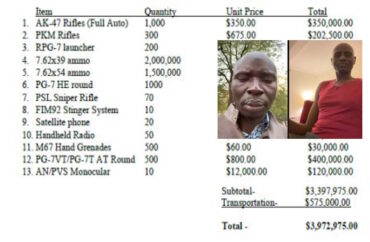
A Harvard University fellow has been charged with attempting to buy and smuggle millions of dollars in arms to South Sudan to aid in a coup.
Peter Biar Ajak, 40, fled South Sudan with the help of the American government four years ago after claiming that he was a target of the country’s president, the Daily Mail reported. He was granted refugee status, and has been working as a fellow at Harvard Kennedy School’s Belfer Center for Science and International Affairs.
But Ajak, and his confederate Abraham Chol Keech, a naturalized U.S. citizen who lives and works in Utah, are now alleged to have been on a buying spree to send $4 million worth of Stinger missile systems, grenade launchers, sniper rifles, automatic rifles, and ammunition back home to support a violent uprising, according to a federal criminal complaint unsealed March 4.
“Keech and Ajak knew that smuggling the weapons and ammunition out of the country without a license from the U.S. government was illegal and would violate U.S. laws. Nevertheless, in or around February 2024, they caused funds to be transferred to undercover agents through U.S. Company-1 to purchase approximately $4 million worth of munitions and other goods for illegal export to South Sudan,” the complaint reads.
Ajak, a former World Bank economist who lives in Maryland, had been in talks to buy arms with what turned out to be undercover federal agents since at least Feb. 20, 2023. The complaint alleges Ajak and Keech attempted to purchase arms from undercover law enforcement agents “to effect a nondemocratic regime change in South Sudan,” according to the Harvard Crimson.
Ajak, who has a master’s in public administration from the Kennedy School in 2009, was put on administrative leave last Wednesday following the DOJ charges, the student newspaper reported. Ajak and Harvard declined to comment to the Crimson.
“Ajak, a former child soldier, is well-known among the African community in Washington D.C. as an exiled South Sudanese opposition leader and purported peace activist,” the Daily Mail noted.
South Sudan, which became a country in 2011, is subject to a U.N. arms embargo due to the extreme levels of violence between armed factions, as well as the displacement of thousands of people, the Department of Justice said in a March 5 news release:
As alleged in court documents, between at least February 2023 and February 2024, Keech and Ajak sought to illegally purchase weapons and related export-controlled items from undercover law enforcement agents and smuggle those weapons and items from the United States to South Sudan through a third country. The defendants knew that South Sudan was subject to an arms embargo and that exporting weapons and ammunition from the United States to South Sudan without a license from the U.S. government was illegal and would violate U.S. law. For example, the defendants openly discussed the illegality of the transaction, expressed the need to be discreet, and agreed to pay a risk fee for the weapons because of the illegal nature of the arms sale. In addition, to facilitate the smuggling scheme, the defendants discussed disguising the weapons as humanitarian aid and paying bribes.
If convicted, the department added, the defendants face up to 20 years in prison for conspiring to violate the Arms Export Control Act, up to 20 years for conspiring to violate the Export Control Reform Act, and up to 10 years for smuggling arms from the United States.
MORE: Ethics probe launched into Harvard overseer whose law firm billed school $42 million
IMAGES: Department of Justice
Like The College Fix on Facebook / Follow us on Twitter





Please join the conversation about our stories on Facebook, Twitter, Instagram, Reddit, MeWe, Rumble, Gab, Minds and Gettr.